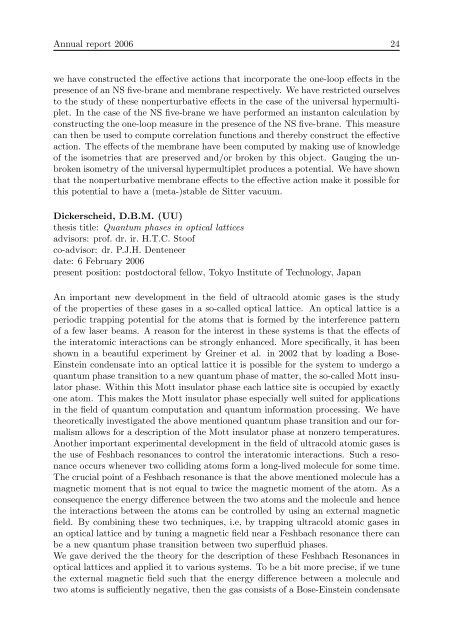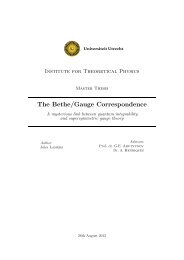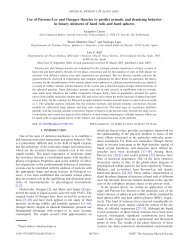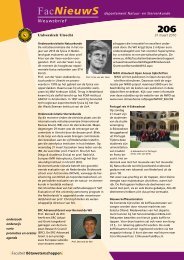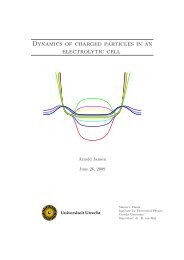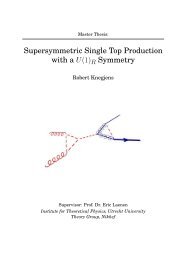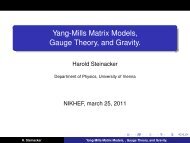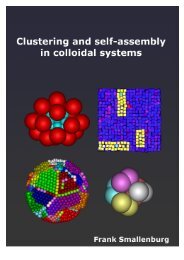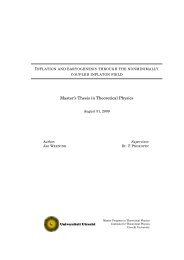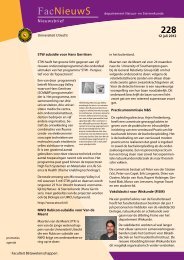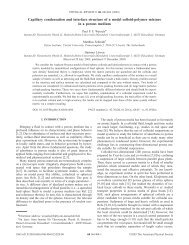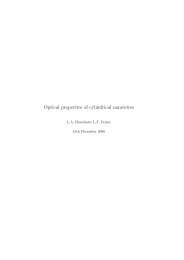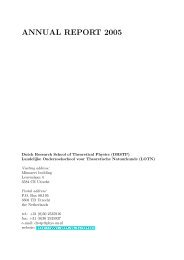ANNUAL REPORT 2006
ANNUAL REPORT 2006
ANNUAL REPORT 2006
- No tags were found...
You also want an ePaper? Increase the reach of your titles
YUMPU automatically turns print PDFs into web optimized ePapers that Google loves.
Annual report <strong>2006</strong> 24<br />
we have constructed the effective actions that incorporate the one-loop effects in the<br />
presence of an NS five-brane and membrane respectively. We have restricted ourselves<br />
to the study of these nonperturbative effects in the case of the universal hypermultiplet.<br />
In the case of the NS five-brane we have performed an instanton calculation by<br />
constructing the one-loop measure in the presence of the NS five-brane. This measure<br />
can then be used to compute correlation functions and thereby construct the effective<br />
action. The effects of the membrane have been computed by making use of knowledge<br />
of the isometries that are preserved and/or broken by this object. Gauging the unbroken<br />
isometry of the universal hypermultiplet produces a potential. We have shown<br />
that the nonperturbative membrane effects to the effective action make it possible for<br />
this potential to have a (meta-)stable de Sitter vacuum.<br />
Dickerscheid, D.B.M. (UU)<br />
thesis title: Quantum phases in optical lattices<br />
advisors: prof. dr. ir. H.T.C. Stoof<br />
co-advisor: dr. P.J.H. Denteneer<br />
date: 6 February <strong>2006</strong><br />
present position: postdoctoral fellow, Tokyo Institute of Technology, Japan<br />
An important new development in the field of ultracold atomic gases is the study<br />
of the properties of these gases in a so-called optical lattice. An optical lattice is a<br />
periodic trapping potential for the atoms that is formed by the interference pattern<br />
of a few laser beams. A reason for the interest in these systems is that the effects of<br />
the interatomic interactions can be strongly enhanced. More specifically, it has been<br />
shown in a beautiful experiment by Greiner et al. in 2002 that by loading a Bose-<br />
Einstein condensate into an optical lattice it is possible for the system to undergo a<br />
quantum phase transition to a new quantum phase of matter, the so-called Mott insulator<br />
phase. Within this Mott insulator phase each lattice site is occupied by exactly<br />
one atom. This makes the Mott insulator phase especially well suited for applications<br />
in the field of quantum computation and quantum information processing. We have<br />
theoretically investigated the above mentioned quantum phase transition and our formalism<br />
allows for a description of the Mott insulator phase at nonzero temperatures.<br />
Another important experimental development in the field of ultracold atomic gases is<br />
the use of Feshbach resonances to control the interatomic interactions. Such a resonance<br />
occurs whenever two colliding atoms form a long-lived molecule for some time.<br />
The crucial point of a Feshbach resonance is that the above mentioned molecule has a<br />
magnetic moment that is not equal to twice the magnetic moment of the atom. As a<br />
consequence the energy difference between the two atoms and the molecule and hence<br />
the interactions between the atoms can be controlled by using an external magnetic<br />
field. By combining these two techniques, i.e, by trapping ultracold atomic gases in<br />
an optical lattice and by tuning a magnetic field near a Feshbach resonance there can<br />
be a new quantum phase transition between two superfluid phases.<br />
We gave derived the the theory for the description of these Feshbach Resonances in<br />
optical lattices and applied it to various systems. To be a bit more precise, if we tune<br />
the external magnetic field such that the energy difference between a molecule and<br />
two atoms is sufficiently negative, then the gas consists of a Bose-Einstein condensate


